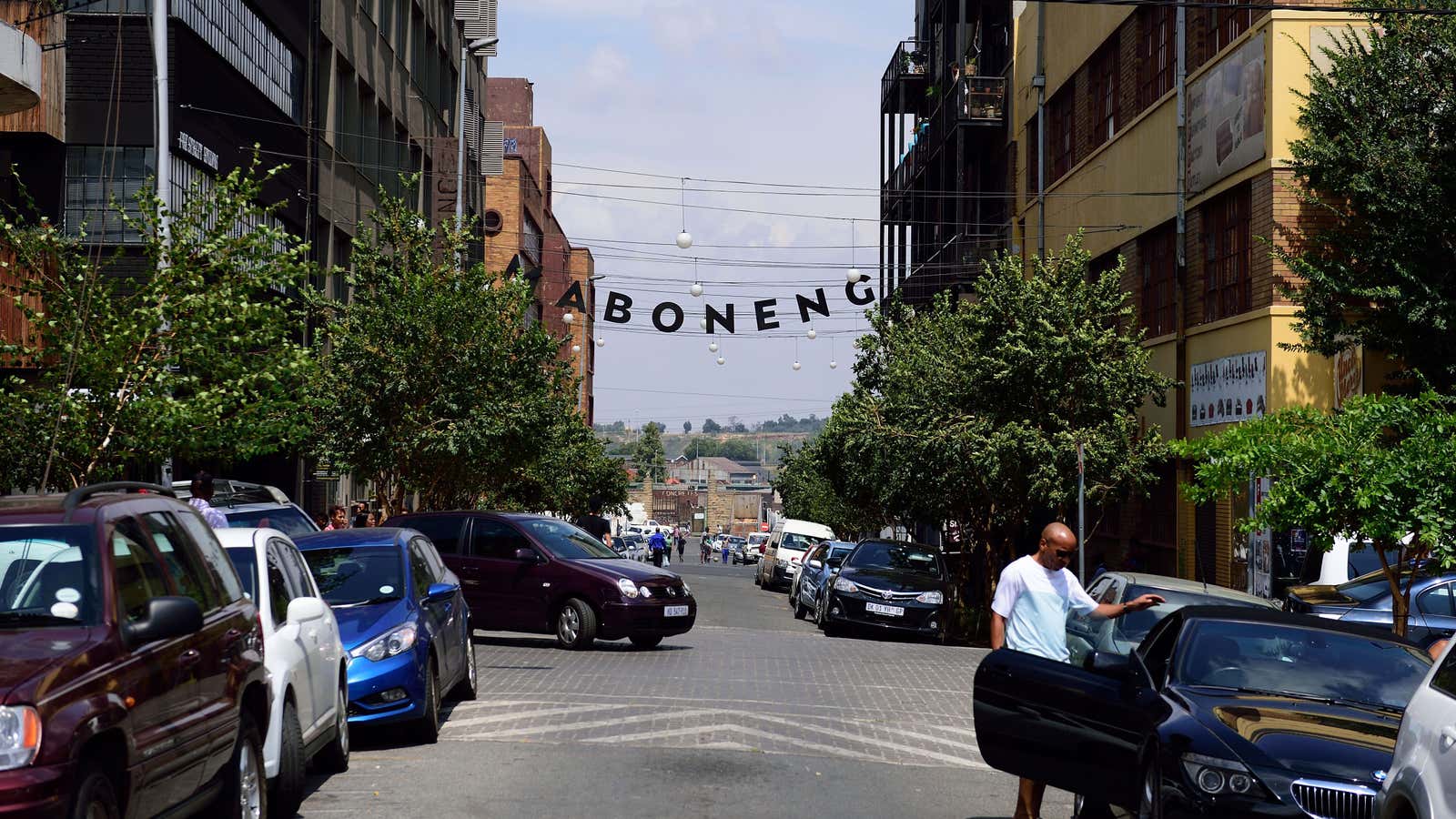With its edgy galleries, artisanal shops, and popular Sunday market, the downtown Johannesburg district Maboneng was a symbol of how urban decay could be conquered through property development. A decade after it opened to the public, however, the architects of this at-times controversial turnaround have caved to some tough realities. Its future could now include a mall.
On April 15, 18 properties in the area will go under the hammer in a liquidation sale, marking the end of Propertuity, the company behind the precinct. The sale will includes assets in South Africa’s coastal city of Durban, where Propertuity tried a similar mode of reclaiming the inner-city.
Jonathan Liebmann founded Propertuity at just 24, and went on to build Maboneng, which means “place of lights” in seTswana, into a multi-dimensional commercial and residential district with a property portfolio of over 1 billion rand ($70.8 million). Many welcomed Propertuity’s efforts to revive Johannesburg’s inner-city. He enlisted local artists, creatives, and businesspeople to change the working class neighborhood, largely abandoned by white tenants at the end of apartheid, and was celebrated for turning “an inner city slum into a hipster hangout.” As a private property investor, he spotted an opportunity where few dared to even look.
But the project was also criticized for perpetuating spatial apartheid by making the area too expensive for the poor already living there. The area is occupied by poor black South Africans and African immigrants who have had to contend with absentee or exploitative landlords. The majority of Propertuity’s property owners are white, aged between 25 and 34, and able to spend the at least half a million rand (over $35,000) list price for some of Maboneng’s studio apartments. Since property prices were already low, Liebmann argued that this was not gentrification, but rather renewal and reinvestment.
In 2016, financial services firm Rand Merchant Bank (RMB) bought a 49.6% stake in the company. Not soon after, Propertuity showed signs of cracking. Liebmann quit last May, followed by about 50 staffers. He insisted that he was on good terms with RMB, but in typical PR speak, said that their visions did not align and that the country’s ailing property market had influenced his decision. Propertuity could not be reached for comment and its website is “closed due to non-payment.”
In their 2018 annual report (pdf), RMB conceded that it had “underestimated the operational complexity of expanding the business,” and decided to liquidate Propertuity. Liebmann’s venture had a number of company-specific challenges, RMB said, including “overly-optimistic asset selection, unfeasible valuation expectations, [and] limited management capacity.”
Some property owners have become disillusioned with the disconnect between Maboneng’s trendy, Instagrammable image, and the day-to-day management of the precinct. Still, S’thembiso Dube, a representative of the Maboneng Civic Association says Propertuity’s troubles won’t affect how the precinct is run going forward.
Nobuhle Bekwa of Lukhanyo Property, which took over Maboneng’s rental and sales from Propertuity last year, is optimistic about the new direction Maboneng is heading in. “The area will not die, it will continuously grow,” she said.
Even as Propertuity is collapsing, there are new developments under construction in the precinct, with talks of a mall. Those who prefer artisanal stores and Sunday markets might groan, but it’s a strategy that has worked for mall-mad South Africa. Across town, another urban regeneration project, the Newtown precinct, let go of some of its artistic ambitions to welcome a shopping center. There are still galleries and theaters, but these are not the primary tenants and they don’t attract the kind of traffic that has revived night-life in the area.
It may not look as good on Instagram, but the move has helped Newtown attract low-and middle-income residents and thrive in a more inclusive way. In this way, a mall might not be the worst thing that could happen to Maboneng.
